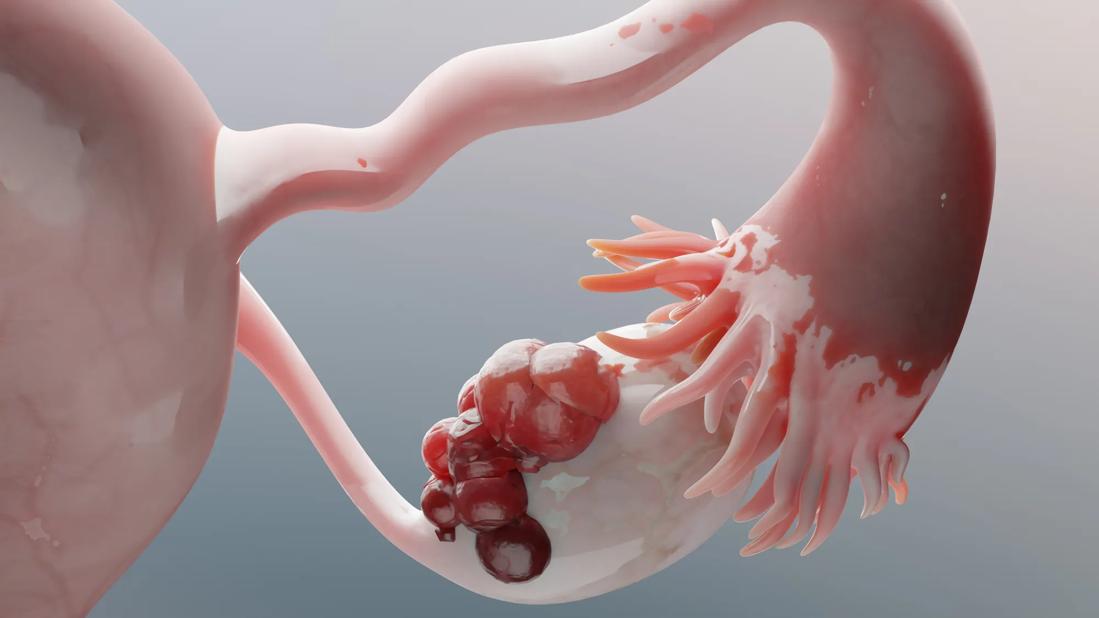Trial examines novel approach for a disease with a high mortality rate

Image content: This image is available to view online.
View image online (https://assets.clevelandclinic.org/transform/a822a8e5-4dac-4624-a2b2-76fd14d74052/ovarian-tumor-1594194123)
Ovarian tumor
Cleveland Clinic is among 14 U.S. healthcare centers invited to take part in an international phase 2 trial of a new generation of engineered T-cell therapy for certain patients with advanced ovarian cancer who are resistant to platinum-based chemotherapy.
Advertisement
Cleveland Clinic is a non-profit academic medical center. Advertising on our site helps support our mission. We do not endorse non-Cleveland Clinic products or services. Policy
The trial will evaluate the safety and efficacy of genetically modified ADP-A2M4CD8 cells, alone or with a checkpoint inhibitor (nivolumab), in patients with recurrent ovarian cancer who are positive for HLA-A*02 and whose tumors are positive for expression of melanoma-associated antigen 4.
Cleveland Clinic was the first center to enroll a patient for this trial.
“This is a novel type of immunotherapy that has shown some promise, and in cervical cancer adoptive immunotherapy has earned breakthrough designation by the FDA,” says Peter Rose, MD, a Cleveland Clinic gynecologic oncologist and principal investigator in the trial. “So we're trying to look at this for use with other solid tumors, and especially ovarian cancer, because treatment outcomes there are not as good as we'd like them to be.”
Ovarian cancer is a common gynecological cancer, and the most lethal. Each year there are about 20,000 new cases of ovarian cancer in the United States, according to the American Cancer Society. Seventy percent of patients with ovarian cancer present with stage 3 and 4 disease; early-stage disease causes no symptoms and effective screening tests do not exist.
“Most of our patients present with metastatic disease,” says Dr. Rose. “They can respond well to their initial treatments. But 70% to 80% of these patients will develop recurrent disease and go through a series of different treatments that can prolong their life but are not ultimately curative.”
In recent years, checkpoint inhibitors have become a valuable tool for treatment of many kinds of cancer. “But it really hasn’t had much of an impact on ovarian cancer, where the response rates have been 6% to 10% at best,” he says.
Advertisement
This new trial, however, studies adoptive immunotherapy developed by pharmaceutical researchers at Adaptimmune that uses engineered autologous T cells to reinforce the immune system and allow it to target cancer cells directly.
“We have had a study at Cleveland Clinic for the last five years in cervical cancer using adoptive immunotherapy and have some completer responses, so we were very excited when GOG, the cooperative group for gynecologic oncology, partnered with the immune therapy company,” Dr. Rosesays. “It provides us a way to provide this type of novel immune therapy for our patients at Cleveland Clinic.”
If adoptive immunotherapy is proven safe and effective, it could make a significant impact on the outlook for treating those with the disease, says Dr. Rose. “The idea of adaptive immunotherapy is just coming to the forefront in solid tumors, but it could be a game changer.”
For clinicians treating patients with ovarian cancer in markets with limited resources, Dr. Rose recommends considering outreach to centers that have extensive experience with a variety of treatments and clinical trials.
“At Cleveland Clinic, we have been involved in many clinical trials for gynecologic cancer over the last 20 years,” he says. “That has given patients access to more treatment options. While a number of therapies are currently FDA approved for ovarian cancer in the United States, clinical trials provide new treatment options for patients.”
Advertisement
Advertisement
Two blood tests improve risk in assessment after ovarian ultrasound
Robust research focuses on detection and prevention
Case highlights range of options for treating malignancies in pregnancy
Researchers identify potential path to retaining chemo sensitivity
Clinical trial to assess the value of nutritional, physical therapy and social supports prior to preoperative chemotherapy
Artesunate ointment shows promise as a non-surgical alternative
A well-prepared team meets the distinctive needs of patients at hereditary high risk
Reassessing antibiotic dosage and type and restoring gut biome could improve survival rates